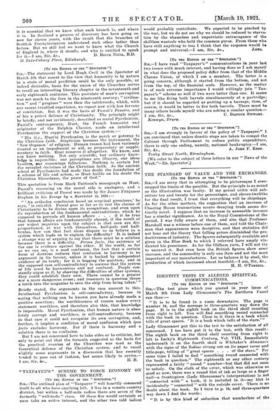[TO THE EDITOR Or SHE " SPECTATOR."] Sia,—The statement by
Lord Hugh Cecil in the Spectator of March 5th that assent to the view that humanity is by nature
in a state of moral perdition could be the only possible, or indeed desirable, basis for the union of the Churches serves to recall an interesting literary chapter in the seventeenth and early eighteenth centuries. This postulate of man's corruption was not much to the fore in the nineteenth century; " civiliza- tion " and " progress" were then the catchwords, which, with our recent troubled experience, we repeat now with less fervour of conviction. But it was the basis of Pascal's Pensees, and of his a priori defence of Christianity. The principle might be briefly, and not invidiously, described as moral Pyrrhonism. Pascal's contemporary, Huet, the French humanist and originator of the Delphin Classics, made an intellectual Pyrrhonism the support of the Christian system :- " His (i.e., Huet's) Pyrrhonism is the porch or gateway to the Christian faith. Scepticism becomes the instrument, the New Organon ' of religion. Human reason had been variously treated as an impediment or aid, as preparatory or supple- mentary to faith. Huet removes it altogether. We know, and can know nothing. Not only scientific, but ordinary know- ledge is impossible; our perceptions are illusory, our ideas baseless, our reasonings fallacious. Nothing is certain but the revealed doctrines of the Christian faith. As the ancient school of Pyrrhonists had made this doubt the foundation of a scheme of life and action, so Huet builds on his doubt the Christian blessedness, the peace of God."
This quotation is from Mark Pattison's monograph on Huet. Pascal's reasoning on the moral side is analogous, and a brilliant criticism of Pascal was made by Sir James Fitzjames Stephen in his Essays by a Barrister in 1858 :— " An orthodox conclusion based on sceptical premisses,' he says, ' is suicidal. Pascal goes so far as to rest the claims of Christianity to be divine upon its recognition, and even upon its reproduction of the fundamental contradictions, which he supposed to pervade all human affairs . . . if it be true that human affairs are fundamentally absurd, if the result of our widest inquiries upon the subject is that men are dis- proportioned, at war with themselves, half-gods and half- brutes, how can that fact alone dispose us to believe in a system which leads us to explain the difficulty? It is indeed u strange way of arguing to say that there must be a solution because there is a difficulty. Prima facie, the existence of the one is evidence against the other. If the world, so far as we can see, is a mad confusion, the fact that a certain form of dootrine reduces that confusion to harmony is no argument in its favour, unless it is backed by independent evidence of its truth; for it is begging the question; and in the supposed case self-contradictory to assume that the system of life must be harmonious and not confused. People con- stantly argue as if, by showing the difficulties of other systems, they could establish their own. There cannot be a greater nor a more dangerous error; and reasoners in question throw a torch into the magazine to save the ship from being taken.' " Briefly stated, the arguments in the case amount to this. Intellectual Pyrrhonism is self-contradictory, because in saying that nothing can be known you have already made a positive assertion; the worthlessness of reason makes every statement worthless, and therefore also this, that knowledge is impossible. Moral Pyrrhonism, that human nature is abeo- lutely corrupt and worthless, is self-contradictory, because in that case it could not recognize its own corruption, and, further, it implies a condition of moral confusion which ipso facto excludes harmony. For if there is harmony and a solution there is no confusion.
But I am not concerned here to take sides or to criticize, but only to point out that the formula suggested as the basis for the practical reunion of the Churches was used as the theoretical defence of the Christian system, and to recall slightly some arguments in a discussion that has recently tended to pass out of fashion, but seems _likely to revive.—
I am, Sir, &c., IL -B.


































 Previous page
Previous page